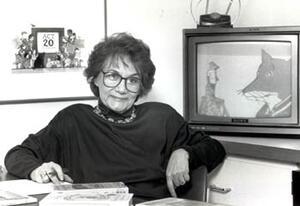Peggy Charren
Peggy Waltzer Charren, born in New York, New York, in 1928, was an activist for children's television programming. Peggy Charren was born and raised in New York City, where she felt that "the whole world was Jewish." She attended Hunter College High School and Connecticut College. Her parents were committed Roosevelt Democrats and sent her to a summer camp where they learned union songs. As a mother to two daughters in the 1960s, Charren noticed there weren't many appealing television programs for kids. She was determined to create a better selection for her children and others. She gathered a few other women with young children, and they formed a non-profit organization called Action for Children's Television (ACT), which advocated for better choices and less commercialization in children's television and fought censorship. They used the law to challenge the broadcast industry and appealed to the Federal Communications Commission and the Federal Trade Commission for better alternatives in children's television. With her hard work and determination, ACT accomplished its goal in 1990 with the passing of the Children's Television Act requiring networks to air programs specifically designed to educate children and limiting the number of commercials aired during these shows. Charren was awarded numerous honorary degrees along with Emmy and Peabody awards, and in 1995 received the Presidential Medal of Freedom. She went on to co-write two books, "Changing Channels: Living (Sensibly) with Television '' and "The TV-Smart Book for Kid," along with serving on many boards and was even a founding board member of the Jewish Women's Archive. Peggy Charren died on January 22, 2015, in Dedham, Massachusetts.
Peggy talks about her family background, childhood memories, and experiences growing up. Her grandparents had come to the United States from Germany and Russia before the turn of the century. She had a liberal, middle-class upbringing. Peggy’s uncle, Sidney Buchman, was a Hollywood writer who was blacklisted during the McCarthy hearings. She explains how the specter of McCarthyism helped forge her lifetime commitment to free speech and First Amendment rights. Peggy also describes her religious practice throughout her life and how her family's relationship with Judaism has changed over time. Peggy had two daughters, Deborah and Claudia. While raising her children, Peggy was concerned by the lack of children's educational programming and the prevalence of violent and product-related shows designed primarily to sell toys to young audiences. Drawing on experience gained in her job at a television station, her skill for organizing, and her boundless energy, she founded, in 1968, Action for Children's Television (ACT), a non-profit organization dedicated to encouraging more diversity in television choices for children. Peggy also reflects on her passion for literature. She explains how she met and married Stanley Charren, an engineer, and how their lives unfolded. Finally, Peggy looks back on her life, her activism, and the many honors she was awarded, including the Presidential Medal of Freedom, as well as the Peabody Award.



